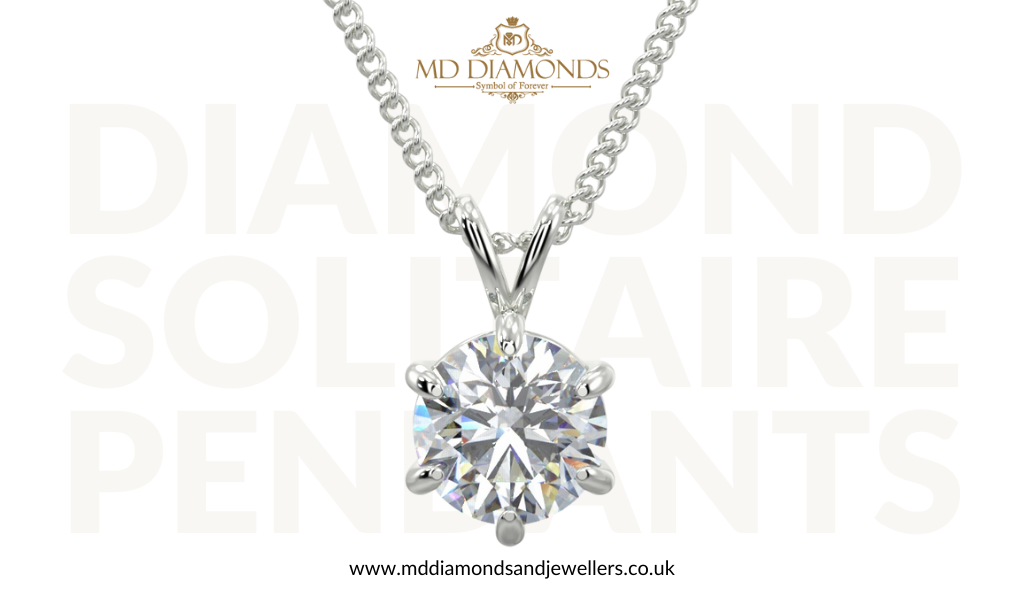Tips for Caring for Your Diamond Solitaire Pendant
A diamond solitaire pendant is more than just a piece of jewellery; it is a timeless symbol of elegance and sophistication. Whether it’s a cherished gift or a well-deserved treat for yourself, maintaining the brilliance and beauty of your solitaire diamond necklace requires proper care. Here are some essential tips for caring for your diamond solitaire pendant to ensure it remains stunning for years to come.

-
Regular Cleaning
Why Regular Cleaning is Important
Diamonds can attract oils and dirt, which can dull their sparkle. Regular cleaning is essential to maintain the shine and clarity of your diamond solitaire pendant. Everyday activities, such as applying lotion or perfume, can cause residue to build up on the surface of the diamond.
How to Clean Your Diamond Solitaire Pendant
- Mild Soapy Water: Mix a small amount of mild dish soap with warm water. Soak your pendant in the solution for about 20-30 minutes. Gently scrub the diamond with a soft toothbrush, paying attention to the setting and the chain. Rinse thoroughly with lukewarm water and pat dry with a soft cloth.
- Avoid Harsh Chemicals: Do not use bleach, chlorine, or other harsh chemicals to clean your pendant, as they can damage the metal and the diamond.
- Professional Cleaning: Consider having your diamond solitaire pendant professionally cleaned once or twice a year. Jewellery stores often offer cleaning services that use ultrasonic cleaners to remove dirt and grime effectively.
-
Proper Storage
Importance of Proper Storage
Proper storage prevents your diamond solitaire pendant from getting scratched or tangled. Diamonds are incredibly hard, but they can still scratch other jewellery if not stored correctly.
How to Store Your Pendant
- Jewellery Box: Store your pendant in a jewellery box with separate compartments to avoid contact with other pieces. Soft, padded compartments are ideal for preventing scratches.
- Individual Pouch: For added protection, keep your pendant in a soft cloth pouch. This is particularly useful when travelling.
- Avoid Clutter: Ensure that your pendant is not stored in a cluttered space where it can get tangled or damaged by other items.
-
Avoid Wearing During Certain Activities
Activities to Avoid
Certain activities can expose your solitaire diamond necklace to damage or loss. It’s best to remove your pendant during:
- Physical Exercise: Activities such as running, swimming, or weightlifting can expose your pendant to sweat, chlorine, and physical impact.
- Household Chores: Cleaning, cooking, or gardening can lead to your pendant coming into contact with harsh chemicals, dirt, and potential impacts.
- Showering: Soap and shampoo residues can build up on your diamond and chain, dulling their shine.
-
Regular Inspections
Why Inspections are Necessary
Regular inspections ensure that the setting of your diamond solitaire pendant remains secure. The prongs holding the diamond can wear down over time, increasing the risk of the diamond becoming loose or falling out.
How to Inspect Your Pendant
- Check the Setting: Examine the prongs and the overall setting for any signs of wear or damage. If you notice any issues, take your pendant to a professional jeweller for repair.
- Professional Inspection: Schedule an inspection with a jeweller once or twice a year. They can check for any potential problems and address them before they become serious.
-
Insurance and Appraisal
Importance of Insurance and Appraisal
Given the value of diamond solitaire pendants, it’s wise to have them insured. This protects you financially in case of loss, theft, or damage.
How to Get Your Pendant Insured
- Appraisal: Have your diamond solitaire pendant appraised by a certified gemologist. This will provide a documented value for insurance purposes.
- Choose the Right Insurance: Ensure your home insurance policy covers jewellery or consider a separate jewellery insurance policy. Provide your insurer with the appraisal documentation.
-
Understanding the Value
Factors Affecting Diamond Solitaire Pendant Price
Understanding the value of your pendant helps in appreciating and caring for it better. Factors that affect the diamond solitaire pendant price include:
- Carat Weight: Larger diamonds typically cost more due to their rarity.
- Cut: The quality of the diamond’s cut affects its brilliance and value.
- Clarity and Colour: Higher clarity and colour grades increase the diamond’s worth.
- Design: The solitaire pendant design can also influence the price, with intricate or custom designs often costing more.
-
Choose the Right Design for Longevity
Selecting a Durable Design
When selecting a solitaire pendant design, consider both aesthetics and durability. Designs that protect the diamond and have robust settings are ideal for everyday wear.
- Round Solitaire Pendant: A round solitaire pendant is not only classic and versatile but also structurally sound, making it a great choice for long-term durability.
Conclusion
Caring for your Diamond Solitaire Pendant involves regular cleaning, proper storage, avoiding exposure to damaging activities, regular inspections, and understanding its value. By following these tips, you can ensure that your solitaire diamond necklace remains a beautiful and cherished piece for years to come. Whether it’s a round solitaire pendant or a more elaborate solitaire pendant design, proper care and attention will keep your jewellery sparkling and secure.
You can connect with us on Facebook







